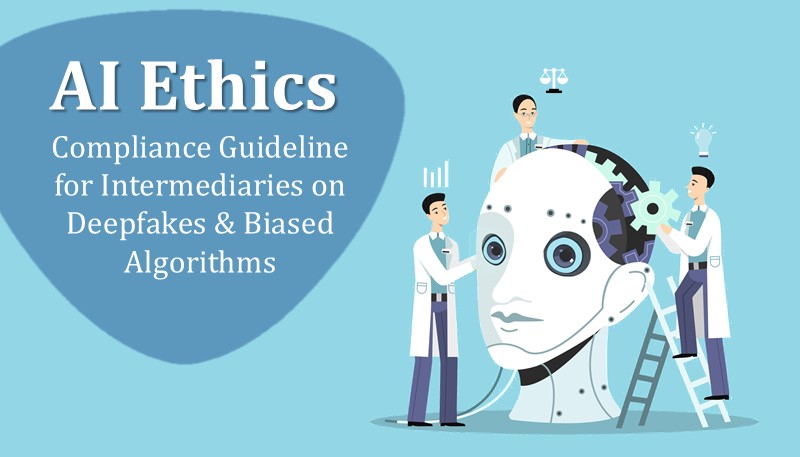INTRODUCTION
In the rapidly evolving digital landscape, intermediaries play a crucial role in facilitating communication and content sharing across various online platforms. But as technology advances, so do the challenges they face. One big concern is the spread of misinformation, especially through AI-generated deepfakes, which can seriously impact online safety and trust.
To address these issues, regulatory bodies like the Ministry of Electronics and Information Technology (MeitY) have, in recent times, been issuing guidelines. These guidelines aim to ensure that intermediaries take responsibility for what happens on their platforms. They emphasize clear communication with users, removal of harmful content, and preventing illegal activities like scamming.
In this blog, we will explore the effects of MeitY’s guidelines on intermediaries. We will discuss key rules they need to follow and the steps they can take to make the digital world safer and more reliable for everyone.
THE TWO ADVISORIES BY THE INDIAN GOVERNMENT
With a view to address the growing concerns regarding the spread of misinformation, especially through AI-generated deepfakes, the Ministry of Electronics and Information Technology (“MeitY”) had issued an advisory in December 2023 (“Advisory directing all intermediaries[1] to ensure compliance with the requirements under the Information Technology (Guidelines for Intermediaries and Digital Media Ethics Code) Rules, 2021”) (“Rules”). The Advisory required the intermediaries to ensure the following:
- Clear communication to the Users about Prohibited Actions: Intermediaries have to ensure through their terms of service and users agreements it is clearly communicate to all their users that they cannot, among other things, host, upload, share any information that belongs to others without proper authorisation. Similarly, users need to be clearly informed that they cannot violate other requirements in Rule 3 (1)(b) of the Information Technology (Guidelines for Intermediaries and Digital Media Ethics Code) Rules, 2021 (“Rules”), including that they are prohibited to host, display, upload, modify, publish, transmit, store, update, or share any information that:
- Is defamatory, obscene, pornographic, invasive of privacy, insulting, harassing, racially or ethnically objectionable, or violates any laws.
- Is harmful to children.
- Infringes upon intellectual property rights.
- Violates any existing laws.
- Deceives or misleads others with false or misleading information.
- Impersonates someone else.
- Threatens national security, public order, or friendly relations with foreign states.
- Contains harmful computer code or software viruses.
- Is intentionally false and intended to mislead or harm others for financial gain.
- Communication to the users about the Legal Consequences: The intermediaries also need to ensure that the users are well informed, including through terms of services and user agreements of the intermediary, about the consequence of dealing with the above-mentioned prohibited information on its platform, under various applicable laws. Further, their terms of service and user agreements must clearly highlight that they are under obligation to report legal violations to the law enforcement agencies under the relevant Indian laws applicable to the context.
- Removal of unlawful contents: Further, the intermediaries were advised to conduct due diligence and remove unlawful contents from their platforms.
- Agreement to Procedures: Intermediaries to incorporate “Agreed to” procedures in their platform to ensure that users do not violate the requirements enumerated in Rule 3(1)(b) of the Rules, as mentioned above.
- Grievance Redressal: The intermediaries must ensure timely redressal of the grievances raised, whether through in-app reporting or through emails to the Grievance Officer. Also, for each grievance received, a ticket must be generated containing details of the grievance and the aggrieved.
- Preventing Advertisement of Illegal Activities: Intermediaries were advised to take additional measures to prevent the advertisement of illegal loans and betting apps that have the potential to scam and mislead users. Further, it was clarified that the consequences of such advertisements, including any resulting scams or misinformation, will solely be the responsibility of the intermediaries.
In response to instances of non-compliance with the Advisory and the due diligence obligations outlined in the Rules, MeitY has issued additional directives to all intermediaries. Intermediaries are now advised to ensure compliance with the following:
- Compliance with the Information Technology Act 2000: The intermediaries need to ensure that the Artificial Intelligence models / LLM / Generative AI, software, or algorithms used on their platforms shall not facilitate the hosting, displaying, sharing, modifying, or dissemination of unlawful content outlined in Rule 3(1)(b) of the Rules (listed above) or violate any other provisions of the Information Technology Act 2000.
- Electoral Integrity: The intermediaries also need to ensure that its computer resources do not promote bias, discrimination, or jeopardize the integrity of the electoral process. This includes ensuring that Artificial Intelligence technologies are not used in a manner that undermines electoral fairness.
- Government Permission for “Under-Testing” AI: The intermediaries must:
- Seek explicit permission from the Government of India before deploying Artificial Intelligence models software, or algorithms on the Indian internet which are still undergoing testing or are unreliable.
- Ensure that any such deployment is accompanied by clear labelling of the potential fallibility or unreliability of the output generated.
- Implement a ‘consent popup’ mechanism to inform users explicitly about the inherent limitations of under-testing or unreliable AI technologies.
- User Awareness: The intermediaries need to clearly inform all users, through terms of service and user agreements, about the consequences of engaging with unlawful information, as enumerated Rule 3(1)(b) of the Rules, on the platform. Also, they must clearly outline potential actions such as disabling access to or removal of non-compliant information, suspension or termination of user accounts, and possible legal repercussions under applicable laws.
- Labelling of Synthetic Content: If any intermediary’s software or computer resource allows the creation, generation, or modification of text, audio, visual, or audio-visual content that could potentially be used as misinformation or deepfakes, such intermediary is advised to label or embed such content with a unique metadata or identifier. Such label or identifier should be permanent and unique, and must facilitate:
- Identification of such information to be created, generated or modified using computer resource of the intermediary.
- Identification of the user of the software or such other computer resource
- Identification of the intermediary through whose software or such other computer resource such information has been created, generated or modified.
- Identification of the creator or first originator of such misinformation or deepfake.
As AI continues to evolve, intermediaries face the challenge of balancing innovation with regulatory compliance and ethical considerations. While the guidelines and obligations set forth provide a foundational framework, their long-term effectiveness in curbing risks like deepfakes and algorithmic bias remains to be seen. By actively engaging with these early-stage requirements, intermediaries can play a constructive role in shaping an ethical and secure digital environment. As the regulatory landscape develops, staying adaptable and vigilant will be key to navigating the complexities of AI governance.
________________________________________________________________________________________________________
Source:
- https://www.meity.gov.in/writereaddata/files/Eradicated_Advisory_26Dec2023.pdf
- https://pib.gov.in/PressReleaseIframePage.aspx?PRID=1990542
- https://lexplosion.in/wp-content/uploads/2024/11/Meity_Advisory_to_Intermediaries-and-platforms.pdf
[1] S. 2(1)(w) of the Information Technology Act, 2000, ‘Intermediary’, with respect to any particular electronic records, means any person who on behalf of another person receives, stores or transmits that record or provides any service with respect to that record and includes telecom service providers, network service providers, internet service providers, web-hosting service providers, search engines, online payment sites, online-auction sites, online-market places and cyber cafes.
________________________________________________________________________________________________________
Written by: Zunaid Akhtar
Co-authored by: Nav Krishna
Disclaimer
This content is intended for informational purposes only and does not constitute a legal opinion. Despite our efforts to maintain accuracy, we do not make representations, warranties or undertakings regarding the quality, completeness or reliability of the content. Readers are encouraged to seek legal counsel prior to acting upon any of the information provided herein. This content, including the design, text, graphics, their selection and arrangement, is Copyright 2024, Lexplosion Solutions Private Limited or its licensors. ALL RIGHTS RESERVED, and all moral rights are asserted and reserved.
For any clarifications, please reach out to us at 91-33-40618083 or inquiries@lexplosion.in. Refer to our privacy policy by clicking here.





